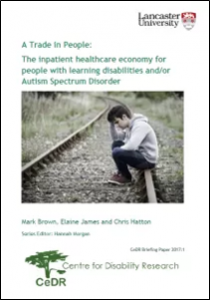Blog from Steven Rose back in May for Learning Disability Today is well worth a read and reflection Steven asks where are we now? in relation to social policy that relates to and influences the lives of people with learning disabilities. He writes that:
‘With the exception of the failing Transforming Care programme there is very little active official social policy relating directly to people with learning disabilities. However, if you look at the unofficial reaction to the very circumstances that prompted the ill-starred Transforming Care programme, the Winterbourne scandal, then you see the seeds of change being sown. Once again it is the activists, the thinkers, the radicals – people prepared to question the status quo – showing a way forward’.
https://www.learningdisabilitytoday.co.uk/how-unofficial-social-policy-drives-change
